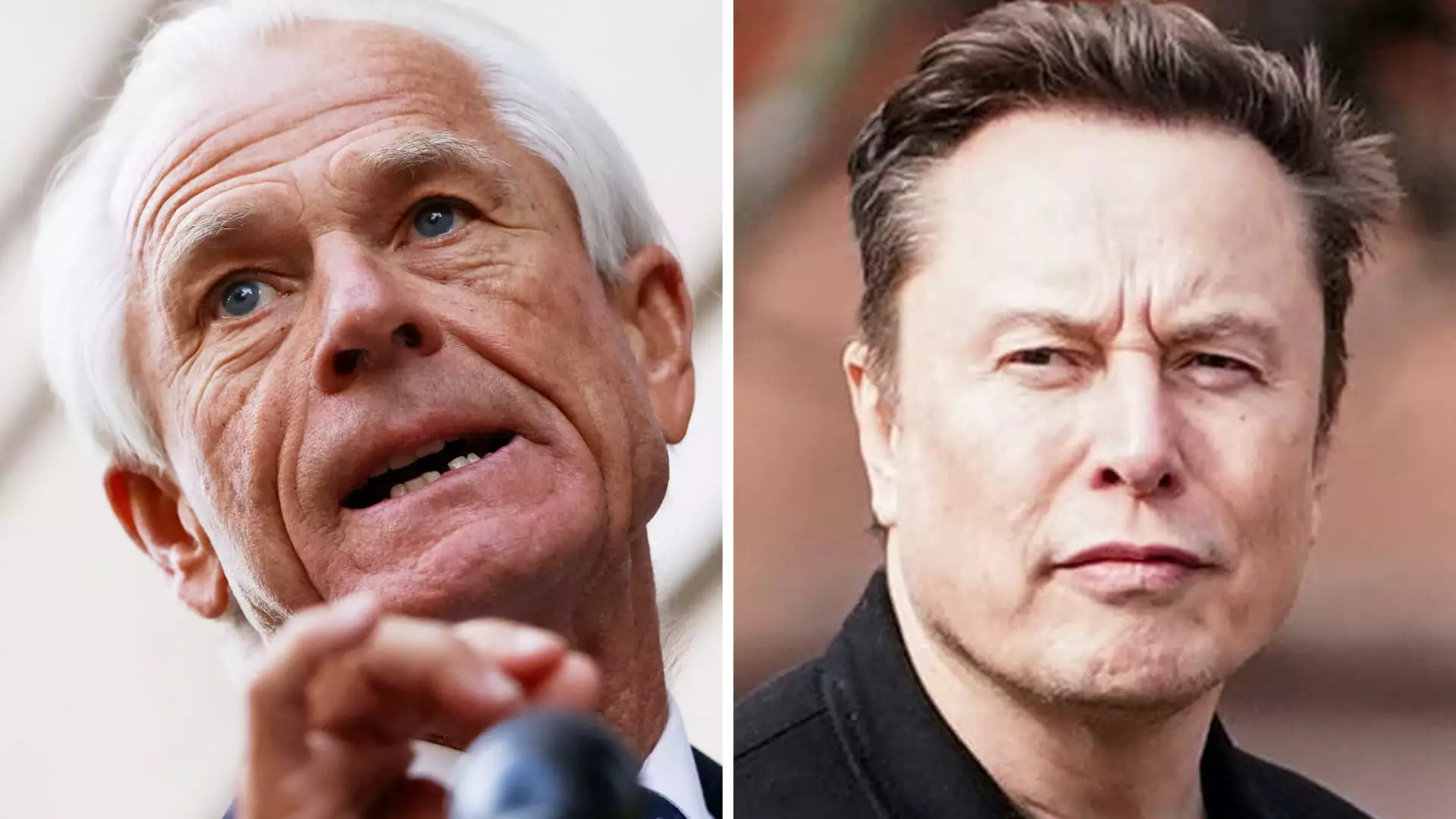The recent skirmish of words between Peter Navarro, a prominent trade advisor, and tech titan Elon Musk sheds light on the often turbulent interplay of egos and ambitions within the current American political landscape. Navarro has defended himself against Musk’s accusation of being a “moron” with an almost casual nonchalance, attributing the spat to mere differences in perspective within their administration. However, this type of dismissive camaraderie belies a deeper conflict that not only reflects on Navarro’s qualifications but also hints at the complexities of trade policy in a fractious political era.
Trade policy in America has long been marred by contention, with competing interests battling to shape national economic directions. This clash encapsulates the multifaceted implications of Donald Trump’s tariff strategies, which Navarro staunchly defends. He implies that he and Musk possess a shared vision, but their divergent opinions on domestic manufacturing reveal fractures in the optimistic facade of unity. While Navarro advocates for increased American production of automobile components, Musk, despite being a key player in the manufacturing industry, believes in a more global outlook—a philosophical divergence that cannot simply be brushed aside.
The Nature of Insults: Laughter in the Face of Discontent
Navarro’s hashtag-laden laughter in response to insults masks a potential crisis in leadership within the administration. His assertion, “I’ve been called worse,” tactfully obscures the implications of Musk’s disdain. The boldness of Musk’s comments—brandishing Navarro as “dumber than a sack of bricks”—suggests that this isn’t merely a playground spat; rather, it signals a significant breach in cohesion within elite circles that are supposed to forge America’s economic future.
In the realm where towering intellect clashes with groundbreaking innovation, personality can make or break alliances. Musk’s public derision towards Navarro possibly undermines not just Navarro’s credibility, but also the broader mission of the Trump administration. Therefore, we must question if Navarro’s jovial demeanor is indeed a sign of confidence or a thin veil shielding the unmistakable anxieties that accompany public turf wars.
The Tariff Tug-of-War: A Reflection on Misguided Ideology
In this politically charged atmosphere, Navarro champions Trump’s administration’s aggressive tariff policy while Musk advocates a more conciliatory stance toward international trade. This tug-of-war raises fundamental questions regarding the efficacy of tariffs and the sense of nationalism they evoke. At a time when international relations are fragile, Musk’s appeal for “zero tariff situations” contrasts with the administration’s shielded stance.
Navarro’s nostalgia for a bygone era of manufacturing jobs in the U.S. is both commendable and misguided. While aiming for a robust domestic economy is a noble pursuit, Navarro’s insistence on isolating American manufacturing through tariffs alienates vital trade partners. This could result in stunted economic growth—not just for companies like Tesla but for industries that thrive on global supply chains. Indeed, Navarro’s vision of a self-sufficient America runs the risk of eroding competitiveness and stifling innovation, raising critical questions about the future trajectory of American economic policy.
The Cult of Personality: Beyond Business to Governance
As Navarro praised Musk for initiatives aimed at eliminating “waste, fraud, and abuse” in the government, one cannot help but dissect the layers of personal allegiance that navigate the currents of governance. When a trade advisor seeks validation from a billionaire, we see the emergence of a peculiar quid pro quo that characterizes modern political dynamics. As the private sector wields increasing influence over public policy, it raises the question: is this a governance model conducive to democratic values?
In the grand theater of American politics, where personal motivations interface with national interests, the true nature of collaboration remains obscured. The eagerness to validate Musk’s contributions while downplaying ideological rifts reflects the high stakes at play, where reputation management can often overshadow substantive policy integrity.
Ultimately, the Navarro-Musk saga invites us to consider not merely the individuals involved but the broader implications of personality-driven politics. The question remains: can we separate the politics of ego from the critical needs of a nation desperate for cohesive economic strategy? In the charged atmosphere of the Trump administration, this dilemma reveals the precarious balance between personal ambition and collective responsibility.


Leave a Reply